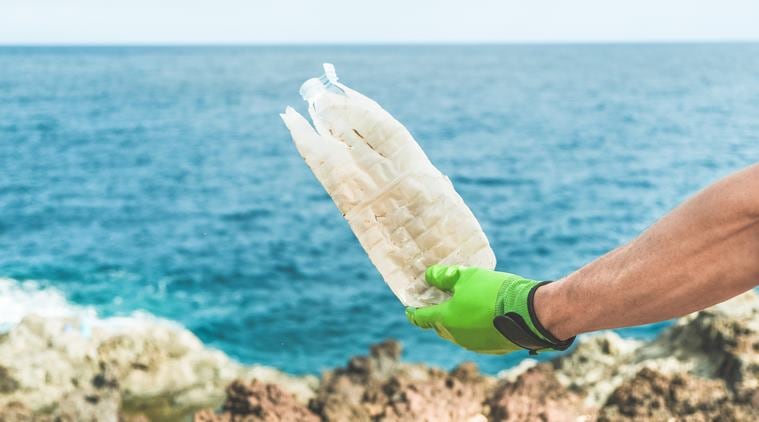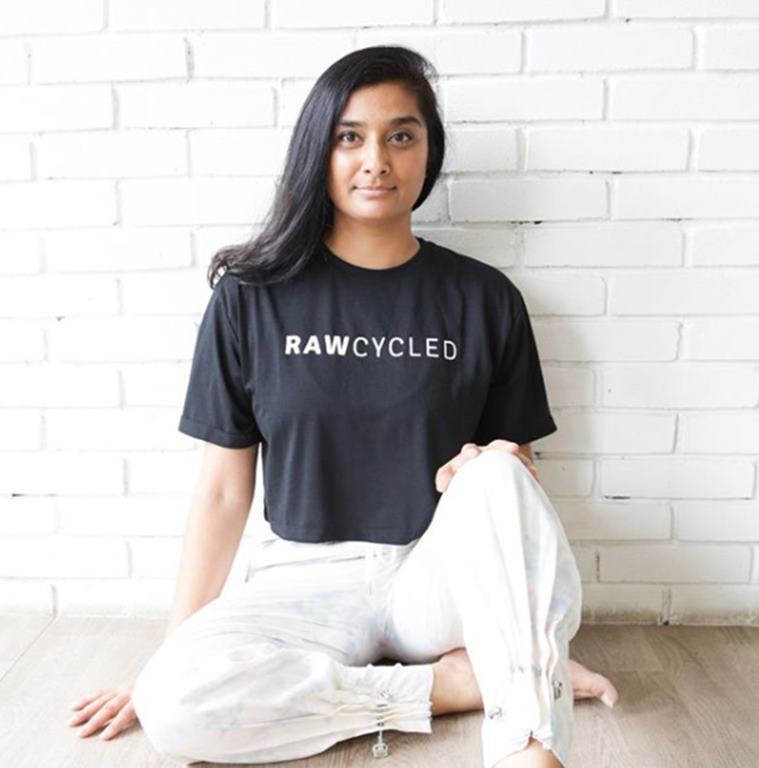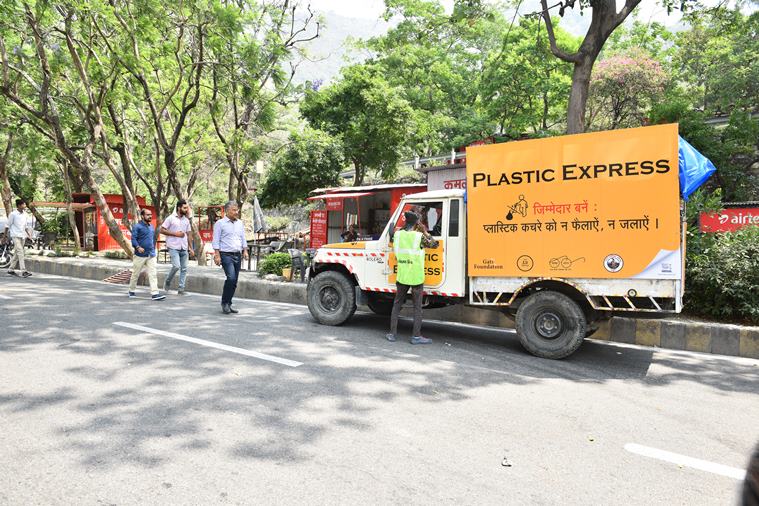
Have you ever imagined wearing an ocean-friendly T-shirt made of plastic? When used plastic bottles are washed and chopped into flakes, melted and formed into chips, extruded into yarn and woven into fabric, then dyed, ocean-friendly, wrinkle-free T-shirts are what you get. ‘Raw Cycled’ T-shirts by cold pressed juice brand Raw Pressery is just one of the recent examples where companies are consciously trying to mitigate plastic pollution through upcycling or recycling. In Raw Pressery’s case, turning every seven empty plastic bottles into a wearable apparel has helped them make a “little impact”.
ALSO READ | You’re unknowingly eating plastic everyday. Here’s what it does to your body
“Our primary goal is to mitigate the amount of plastic which is getting dumped in our wastelands and oceans. Seven Raw Pressery bottles, make one Raw Cycled t-shirt. From the time we started, we have successfully collected 1.2 million bottles. Currently, it’s a drop in the ocean but every little drop counts,” said Atiya Rakyan, ‘chief recycling officer’ of Raw Pressery.

Launched under a collection called Street to Studio, the T-shirts are made of 95 per cent recycled plastic polyester and five per cent synthetic fabric spandex.
Despite plastics being lightweight, versatile and durable and their ubiquitous presence in our daily lives, they are increasingly being seen as a challenge to animals, marine life and future generations.
ALSO READ | You’re addicted to plastic. Can you go cold turkey?
According to a Central Pollution Control Board (CPCB) report, plastic waste generated in India in 2017-18 was a whopping 6,60,787.85 tonnes.
To fight single-use plastic pollution, and go the eco-friendly way, popular brands are opting for measures that align innovation with sustainability. Re-emphasising that everything has value — even plastic — companies are collecting waste from coastal areas and remote islands and coming up with innovative plastic management initiatives.
“The intent is to spread awareness and transform ocean plastic pollution into high-performance sportswear, spinning the problem into a solution, the threat, into a thread,” Sharad Singla, director, brand marketing, Adidas India, told indianexpress.com.
Launched in 2017, Run For The Oceans (RFTO) is a global movement by sportswear brand Adidas and environmental organisation Parley that harnesses the power of sport to draw attention to the devastating levels and impact of marine plastic pollution.

With studies suggesting that one may be eating a credit card’s worth of plastic each week, and companies acknowledging that the use of plastics cannot be done away with, the way ahead lies in looking at useful transformation of plastics.
“We invited the global running community to lace up for the oceans, with Adidas contributing $1 for every kilometre ran between June 8 and 16 in New York (US), Barcelona (Spain) and Shanghai (China). The movement witnessed an overall participation of 87,490 individuals running on the Runtastic app, clocking a total of 1,75,060.81 kms and clearing over 238 tonnes of plastic waste manually as part of the beach clean-up drives, plogging efforts in Delhi, and boats running in mangroves of Mumbai. The waste was then transported to an Adidas supplier who then produced the yarn,” explained Singla.
In 2018, Adidas produced more than five million pairs of running shoes made from plastic. These contained 95 per cent post-consumer recycled (PCR) plastics sourced from ocean and beach clean-ups. The shoes produced were Alphabounce Parley for Rs 9,999 and Alphaboost Parley for Rs 14,999.
A 2017 PwC-Assocham study indicated that owing to poor waste management practices, a staggering 88 square kms of land — nearly equal to the area under the administration of New Delhi Municipal Council — will have to be dedicated for waste disposal through landfilling by 2050.
Valuing plastic means treating it responsibly so that it can be reused and recycled, and does not end up in our oceans and landfills, asserted Antara Kundu, marketing head, The Body Shop – Asia South. “Not using plastic is not the only answer. If used responsibly it can be sustainable, so we need to show love for the plastic that we do use,” she said.
Since an abundant resource of recyclable plastic already exists, The Body Shop uses Community Trade (CT) recycled plastic from Bengaluru, with the help of social organisations such as Plastics For Change and Hasiru Dala.
“This not only helps tackle the existing problem, it will also help to empower the waste pickers we support in Bengaluru with access to more sanitary working conditions, a fair price and the respect and recognition they deserve,” explained Kundu.
“Our 250ml haircare bottles are now made of CT Recycled Plastic and we aim to scale this up in the future. In the long run, we aim to become completely closed loop which means we will repurpose all our plastic back into our packaging or for use in our shop fixtures,” she added.
ALSO READ | Here’s how you can do your bit to rid the world from suffocating with plastics
REFASH, one of the first global upcycled fashion platform started in 2018, curated Mumbai’s first week-long exhibit of upcycling designers in August this year. As part of REFASH Pop Up, many activities were conducted in the form of ‘mending’ workshops, ‘repair’ events and talks to initiate conversations around upcycling. Besides that, the event showcased some creative upcycling designers such as I was a Sari, Inai, Iro Iro, The loom art among others.

The founder Akanksha Kaila Akashi said, “Upcycling is not a new concept in India. It has been present in our Indian households for generations – only the term is new. Our vision with the REFASH Pop Up is to give a platform to young Indian designers and brands who are re-looking at waste and designing products that are unique and helping in achieving a circular economy.”
To tackle the growing amounts of plastic waste in both urban and rural areas, the Government of India issued the Plastic Waste Management Rules in 2016. A core feature of it is the Extended Producer Responsibility (EPR), which mandates producers to establish collection systems for generated waste in close collaboration with state urban development departments.
In tune with the EPR and their “global commitment” of making plastic reusable or recyclable by 2025 and achieving plastic neutrality, Nestle India has stepped up initiatives towards plastic waste management through conducting various pilot projects. “Our vision is that none of our packaging, including plastics, ends up in landfill or as litter. We work with Producer Responsibility Organisations (PROs) to create awareness amongst waste pickers to collect, segregate, recycle and responsibly dispose post-consumer plastic waste by sending it to waste-to-energy plants and cement kilns,” Sanjay Khajuria, director, corporate affairs, Nestlé India told indianexpress.com.

Back in 2018, Nestlé India worked in 12 states as part of EPR and extended the implementation of pilots to 20 states in 2019 including Bihar, Haryana, Himachal Pradesh, Karnataka, Goa, Gujarat and Maharashtra.
ALSO READ | World Environment Day 2018: Simple lifestyle hacks for a greener living
Companies state that a circular economy fuelled by ‘reduce-recover-reuse-recycle-redesign-re-manufacture’ approach rather than ‘produce-consume-dispose’ led linear economy approach is far more “regenerative and restorative in nature”.
“The usage of plastic cannot be stopped by companies and industries entirely since it is reasonable, flexible, and sturdy. However, they can be recycled into many products like kitchenware, clothing, and carpets, and in turn, be sold in the market. Not only does this lead to environmental conservation, but also a circular economy,” explained Rakyan.